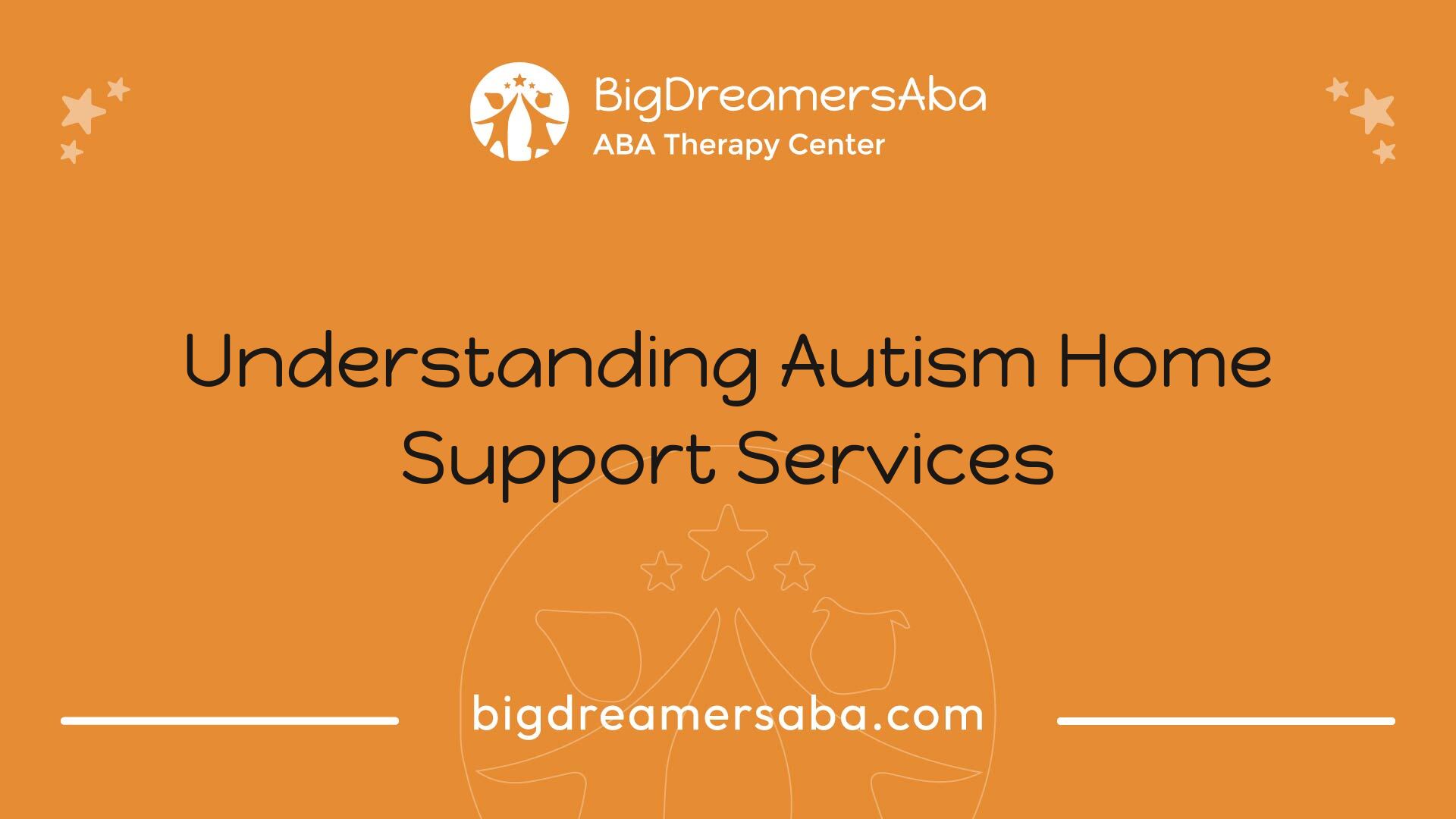Understanding Autism Home Support Services
Explore autism home support services and discover effective therapies to foster growth and success for individuals.


Understanding Autism
Overview of Autism
Autism Spectrum Disorder (ASD) is a complex neurodevelopmental disorder that affects communication, behavior, and social interactions. The term "spectrum" reflects the wide range of symptoms and abilities that individuals with autism may experience. Some individuals may require significant support in their daily lives, while others may function independently. Approximately 1 in 8 children with ASD (12.1%) experience at least one unmet medical care need, highlighting the importance of access to autism home support services for these individuals and their families.
Characteristics of Autism
The characteristics of autism can vary widely from person to person. However, common traits include challenges in social communication, repetitive behaviors, and restricted interests. Understanding these characteristics can lead to better support and resources for individuals with autism.
CharacteristicDescriptionSocial Communication DifficultiesChallenges in understanding and using verbal and nonverbal communication, including difficulties in initiating or maintaining conversations.Repetitive BehaviorsEngaging in repetitive motions, such as hand-flapping or rocking, and exhibiting inflexible adherence to routines.Restricted InterestsIntense focus on specific topics or activities, often to the exclusion of other interests.
Children with autism often exhibit these characteristics in various combinations. The responses to these traits can vary, which may affect how they navigate everyday situations. For example, children with ASD in the Northeast are more likely to have received any specialty care, in contrast to those in the South who face challenges in accessing appropriate care [1]. Addressing these challenges through effective support services is crucial for enhancing the quality of life for individuals with autism.
Therapeutic Approaches

Various therapeutic approaches play a significant role in supporting individuals with autism. These methods aim to enhance communication, independence, and quality of life. The most common therapeutic approaches include Applied Behavior Analysis (ABA) therapy, speech and language therapy, and occupational therapy.
Applied Behavior Analysis (ABA) Therapy
Applied Behavior Analysis (ABA) therapy is a widely recognized and evidence-based therapy specifically designed for individuals with autism. It focuses on identifying and modifying behaviors, teaching new skills, and promoting positive actions. ABA therapy has shown significant success in enhancing communication, reducing challenging behaviors, and improving the overall quality of life for individuals with autism [2].
Key Features of ABA TherapyOutcomesFocus on behavior modificationEnhanced communication skillsUse of positive reinforcementReduction of challenging behaviorsIndividualized treatment plansImprovement in overall quality of life
Speech and Language Therapy
Speech and language therapy addresses communication challenges faced by individuals on the autism spectrum. This therapy aims to develop both verbal and non-verbal communication skills, making it easier for individuals to express their needs, thoughts, and emotions effectively [3].
The key components of speech therapy typically include:
Key ComponentsDescriptionVerbal CommunicationEnhances the ability to speak and articulate wordsNon-Verbal CommunicationInvolves using gestures, expressions, and body languageSocial Communication SkillsSupports interaction in social settings
Occupational Therapy
Occupational therapy for autism focuses on developing essential daily living skills, motor skills, and sensory skills. This therapy enhances independence, self-care abilities, and overall quality of life for individuals with autism. It uses various activities targeting sensory integration, motor coordination, self-help skills, and social interaction [2].
Here are some aspects of occupational therapy:
Focus AreasGoalsDaily Living SkillsImprovement in self-care routines and independenceMotor SkillsDevelopment of fine and gross motor abilitiesSensory IntegrationAssistance with sensory processing and regulation
Through these therapeutic approaches, individuals with autism are provided with vital support in developing the skills they need to navigate their daily lives more effectively. For further information on autism and available resources, explore our articles on autism life span and how autism affects daily life adults.
Home Support Services

Home support services play a crucial role in enhancing the quality of life for individuals with autism. These services encompass various areas, including social skills training, job coaching and support, and in-home and respite care.
Social Skills Training
Social skills training is an essential aspect of autism home support services. This training aims to teach individuals with autism the necessary skills to initiate and maintain social relationships, interpret social cues, and navigate social situations successfully. The program typically includes role-playing exercises, group activities, and real-life scenarios to facilitate learning. Through these methods, individuals can improve their ability to communicate effectively and build meaningful connections with others.
Skill AreaDescriptionInitiating RelationshipsTechniques to start conversations and make friendsUnderstanding CuesRecognizing body language and toneSustaining ConversationsSkills to keep dialogues flowing
Job Coaching and Support
Job coaching for adults with autism assists individuals in developing the skills needed to succeed in the workplace. Services may include resume writing, interview skills, workplace etiquette, and on-the-job training [3]. Job coaches provide personalized support, helping individuals navigate the challenges of employment and integrating into the workforce.
Coaching ElementPurposeResume WritingCrafting effective resumes tailored to specific jobsInterview PreparationPracticing responses to common interview questionsWorkplace EtiquetteUnderstanding professional conduct and interactions
In-Home and Respite Care
In-home care and respite care are vital components of autism home support services. In-home caregivers assist individuals with daily living activities, such as cooking, bathing, and medication management. Respite care offers temporary relief for overwhelmed caregivers, allowing them time to recharge while ensuring that their loved ones receive quality care.
Care TypeDescriptionIn-Home CareAssistance with daily living activitiesRespite CareTemporary support to relieve family caregivers
These home support services provide essential resources that empower individuals with autism and their families. By enhancing social skills, supporting employment endeavors, and offering caregiving relief, these services can significantly improve the daily lives of those on the autism spectrum. For more insights into how autism affects life stages, visit autism life span.
Individual Success Stories
Highlighting individual success stories brings to light the transformative impact of therapeutic interventions on children and families affected by autism. The following testimonials reflect the positive changes attributed to autism home support services, particularly programs like The Son-Rise Program.
Impact of Therapeutic Interventions
Families utilizing The Son-Rise Program for Autism have reported remarkable developments in their children's behavior and skills. These improvements extend beyond the child, positively affecting family dynamics and overall well-being. A parent shared how her son transitioned to a Montessori school as a 'typical' student after applying Son-Rise techniques. Previously non-verbal and demonstrating obsessive behaviors, he is now fully verbal, engaging in conversations, and eager to interact and learn.
Another mother's journey illustrates the benefits of therapy. Her child, Antonio, demonstrated limited socialization and frequent somersaulting. Following the application of the Son-Rise Program at home, Antonio has shown significant progress, including a longer attention span and improved social interaction skills. He now actively seeks engagement from others, a crucial milestone for his development [4].
Family Testimonials
Parents have shared touching testimonials that underscore the positive changes in their lives due to autism home support services. One mother with three children on the Autism Spectrum expressed her heartfelt gratitude for the scholarships her family received to attend Son-Rise and Personal Growth programs. She reported that her children have exhibited signs of recovery from autism, leading to her own improved outlook on life. With reduced reliance on anti-depressants and increased energy levels, she noted a significant enhancement in her family's quality of life [4].
These success stories serve as powerful reminders of the potential impact that autism home support services, particularly therapeutic interventions, can have on individuals and families. They highlight the hope and positive outcomes that can arise from dedicated support and a nurturing environment, showing how personalized interventions lead to life-changing results.
Regional Disparities in ASD Services
Understanding the disparities in autism home support services is key to ensuring that all individuals with autism spectrum disorder (ASD) receive the necessary assistance and resources. This section explores the availability of services based on geographical regions and the specific challenges faced by rural communities.
Service Availability by Region
The availability of ASD services can vary significantly among different regions. Urban and suburban areas typically offer a broader range of providers and services compared to rural neighborhoods. For instance, individuals residing in rural neighborhoods often have fewer available ASD providers. This situation can lead to disparities in access to essential support services that are crucial for individuals with autism.
The following table summarizes the differences in service availability in urban, suburban, and rural regions:
Region TypeNumber of ASD ProvidersAccessibility RatingUrbanHighExcellentSuburbanModerateGoodRuralLowLimited
Providers in rural areas frequently face challenges, including a higher case load with fewer resources. This can strain their ability to provide quality care to individuals with ASD, leading to significant gaps in service availability.
Challenges in Rural Areas
Families living in rural areas encounter numerous obstacles when seeking autism home support services. Limited service availability combined with geographic isolation often leads to access difficulties. Transportation can be a significant hurdle, making it challenging for families to reach available providers.
Research indicates that rural families with children who have autism tend to experience greater access difficulties compared to those in urban areas. This disparity highlights not only the lack of providers but also broader socioeconomic factors that can contribute to service shortages.
Furthermore, a notable disparity exists in the age of diagnosis between rural and urban communities. Individuals in rural areas may be diagnosed later due to limited access to specialists. This delay can hinder timely intervention, which is critical for effective support and therapy.
Addressing these regional disparities in autism services is crucial for ensuring that individuals with ASD receive appropriate care throughout their life span. For additional insights, consider exploring the autism life span or understanding how autism affects daily life in adults through our dedicated articles.
Privacy and Security Measures
In the realm of autism home support services, privacy and security are of utmost importance. It is essential to ensure that individuals and families feel secure about the handling of their personal information. This section explores how personal information is protected and the various data security measures in place.
Protection of Personal Information
Organizations providing autism home support services are committed to safeguarding the privacy of their clients. These organizations adhere to strict guidelines regarding the collection, processing, and sharing of personal data. The Autism Treatment Center of America & The Option Institute, for instance, emphasizes the importance of secure data handling, aligning their practices with their privacy policy.
To protect personal information, these organizations typically implement the following measures:
Data Security Measures
Data security measures are vital in preventing unauthorized access and ensuring that personal information remains confidential. Organizations often employ industry-standard security technologies to protect their systems and data. The Autism Treatment Center of America outlines their commitment to secure data collection and processing through various practices:
Security MeasureDescriptionEncryptionSensitive data is encrypted during transmission to protect it from interception.FirewallsFirewalls are utilized to block unauthorized access to networks.Regular AuditsSecurity audits are performed regularly to identify and fix vulnerabilities.Training ProgramsStaff members receive training on privacy policies and data security procedures to ensure compliance.
The implementation of these measures helps create a safe environment for both individuals receiving autism home support services and their families. For more information on the impact and benefits of autism services, you can explore topics such as the autism life span and how autism affects daily life adults.
References
[2]:
[3]:
[4]:
[5]:
Recent articles

The Importance of Family-Centered Care in ABA Therapy

How Big Dreamers ABA Addresses the Needs of Children with Autism and Anxiety
